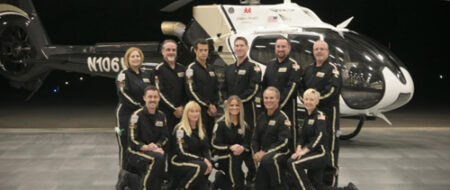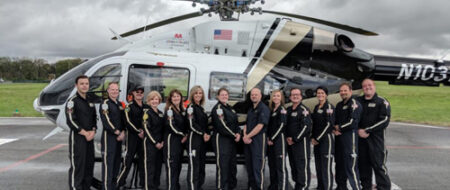by Craig Boerner
Emergency Medicine and Trauma Surgery researchers at Vanderbilt University Medical Center are joining Vanderbilt LifeFlight in a Department of Defense (DOD)-funded clinical trial aimed at improving survival with resuscitation techniques used to keep patients alive after a traumatic injury.
Emergency medicine services (EMS) personnel currently use one of two common strategies to treat a trauma patient who is bleeding — one is with standard salt-water/saline solutions and the other is with blood products, which are often separated into red blood cells and plasma (the part of the blood with blood clotting factors).

“Studies have shown an increased survival rate among patients who receive blood products instead of standard salt-water (aka ‘saline’) solutions,” said Ashley Panas, MD, chief flight physician and assistant medical director for Vanderbilt LifeFlight.
The TOWAR Trial (Type O Whole blood and assessment of Age during prehospital Resuscitation) will enroll more than 1,000 adults who are bleeding and en route to a trauma center to test whether resuscitation with whole blood improves survival.
Bleeding from injury is a significant cause of death after trauma, noted Allan Peetz, MD, assistant professor of Surgery in the Division of Trauma and Surgical Critical Care and TOWAR site-investigator.
“This is especially true within the first hour after injury, or the ‘golden hour,’ where science has shown getting blood is essential,” Peetz said. “Currently, this requires EMS to carry several different components of clotting factors and red blood cells in specialized coolers, which limits the amount and kind of blood products EMS can carry.”

Because traumatically injured patients cannot consent to the trial, the study will undergo a community consultation process and patients will be automatically enrolled if they fit the study criteria. Patients and family members will be notified after enrollment and can opt out of continued participation at that point.
“Whole blood has all of the components of blood in one package and can be administered quickly and easily to a patient at one time,” said Vanderbilt Blood Bank Director Jennifer Andrews, MD, associate professor of Pathology, Microbiology and Immunology.
“When administered quickly after injury in a patient who is bleeding, whole blood may be associated with better treatment of bleeding, better oxygen delivery to the organs and better control of ongoing bleeding,” she said.
The project will be coordinated with the American Red Cross in Middle Tennessee.
The University of Pittsburgh School of Medicine is the clinical coordinating center for TOWAR, which is part of the DOD’s Linking Investigations in Trauma and Emergency Services (LITES) research network of U.S. trauma systems and centers. VUMC has been part of this national team since its inception under Mayur Patel, MD, MPH, associate professor of Surgery in the Division of Trauma and Surgical Critical Care.
In addition to VUMC, current centers participating in TOWAR are Brooke Army Medical Center, UT San Antonio, UT Houston, UT Knoxville, Louisville, Mississippi, Cincinnati and Metro Health in Cleveland.
This research is funded by DOD contract W81XWH-16-D-0024 and registered on clinicaltrials.gov at NCT04684719.



